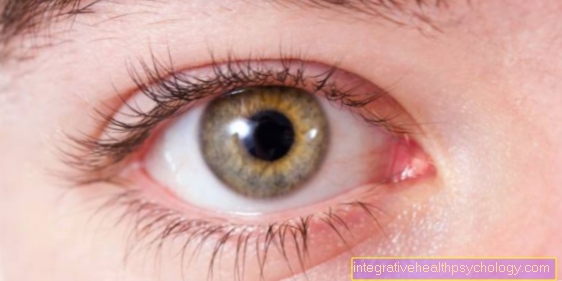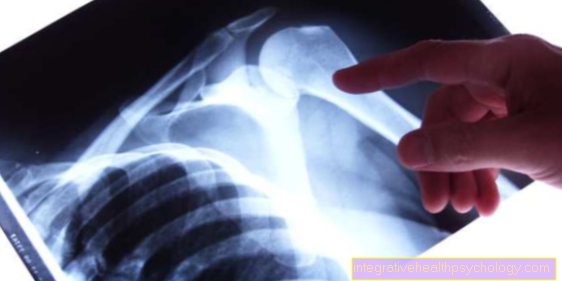Lymph Node Swelling - How Dangerous Is It?
introduction
Lymph node swelling can indicate many diseases that are both harmless, such as a cold or infection, or a symptom of a more serious illness, in the worst, but also in the rarest case, cancer. In principle, however, a swelling indicates that the immune system is currently fighting with pathogens. The lymph nodes are part of the body's lymphatic system, which is part of the immune system and includes several primary and secondary organs. Lymphocytes (immune cells) are formed in the primary lymphatic organs and the lymphocytes are differentiated and further developed in the secondary lymphatic organs. The lymph nodes are secondary organs and are responsible for removing foreign substances and pathogens from the body that are carried along with the lymph. They are found increasingly on the neck, on the armpits and along the aorta (main artery) and of course on all other internal organs.
The lymph vessels run through the body in a similar way to blood vessels and are primarily responsible for ensuring that pathogens do not get deeper into the body, but are transported away again. Normally the lymph nodes reach a size of a few millimeters. However, they can swell significantly and grow up to a few centimeters. Since the lymph nodes that are in the immediate vicinity of the infection or other disease usually swell, the location often already reveals a lot of information to the treating doctor. Although they can be the cause of serious illnesses, swelling of the lymph nodes is in the vast majority of cases "only" a side effect of various inflammations in the body. Usually it is not necessary to treat them specifically, because an intact immune system usually creates the defense itself.
So they are only very rarely classified as dangerous.
Symptoms
You usually cannot feel healthy lymph nodes. But there are always people with isolated lymph nodes always are palpable. These sufferers need to keep an eye on their lymph nodes as they can quickly grow to dangerous sizes. they should regularly be checked by a doctor. Otherwise you can only really feel your lymph nodes when one Inflammatory response is going on in the body. Numerous other symptoms can be associated with the lymph node swelling, but they depend entirely on which one root cause underlies the enlarged lymph nodes. As a rule, however, it is typical flu-like symptoms that accompany lymph node swelling, such as fever, sore throat, runny nose and possibly cough. The lymph nodes may in some cases, depending on the cause Pain cause. At Infections severe pain can occur, especially when touching the lymph nodes. Especially with cancer, however, there is no pain whatsoever, although the lymph nodes can partially with the environment grown together.
More information can be found here: Symptoms of lymph gland cancer, swelling of the lymph glands
Lymph node swelling is often not dangerous, since the most common causes include infectious diseases in close proximity to the swollen lymph node. The infections are usually easy to treat, so that the swelling can recede well if therapy is initiated promptly. Infectious or inflammatory swellings usually develop in a short time and are painful.
However, lymph node swelling can also occur as part of a tumor disease, which is usually associated with a more dangerous course. Typical signs of a possible tumor disease are painless swelling that lasts for several weeks and does not recede. Likewise, the lymph nodes are often difficult to move, baked together and hardened. In such cases, a doctor should be consulted urgently for further clarification.
causes
As already mentioned, the causes are usually diverse and cannot be diagnosed at a glance. When in doubt, you should always get one doctor because there are some serious medical conditions that involve lymph node swelling. If the swollen lymph nodes are accompanied by flu-like symptoms, it is likely that they have become palpable due to a cold or flu, for example. If no other symptoms are noticed, one should definitely see a doctor. Pfeiffer's glandular fever, for example, can be the cause of swelling of the lymph nodes. Most commonly, the Epstein-Barr virus, which causes this condition, is transmitted through saliva, such as when kissing. Especially in young adults, this is the reason why this age group suffers from this disease very often in comparison. In addition to the enlarged lymph nodes, one also finds an enlarged spleen, sore throat and fever, as well fatigue and headaches as symptoms. Unfortunately, other organs can also become infected with this disease, which is why it must be treated as soon as possible. In most cases, the patient has to spend some time in the hospital spend.
Measles and rubella can also be a cause. Most children, however, are vaccinated against these diseases. Still, these are two diseases that can have serious consequences if left untreated. HIV / AIDS can also be a cause of enlarged lymph nodes (Please also read: Lymph Node Swelling - What Evidence Is There It Is HIV?). Genital herpes and other sexually transmitted diseases such as syphilis and chlamydia are also potential causes of lymph node swelling. Also cancers like malicious Lymphomas and a few leukemias can cause lymph node swelling as well benign Lymphoma. Tuberculosis and borreliosis as well as diphtheria should not be forgotten either. In addition, lymph node swellings are often the result of tonsillitis, as these are also part of the lymphatic organs and the lymph nodes of the neck, which are located in the vicinity, also react.
Please also read our page Chronic swelling of the lymph nodes.
diagnosis
The enlarged lymph nodes and the underlying cause are diagnosed using anamnesis and a thorough physical examination, including the lymphatic tissue in the mouth and throat. If more serious illnesses are suspected, further examinations will be carried out. The spleen and liver are scanned and for a more precise diagnosis there is the imaging procedureswhich can bring further clarity. To Diagnosis of lymph gland cancer but only brings one Tissue sample from the suspicious lymph node certainty. It is also important that the entire body is examined and subjected to imaging tests. The tissue sample is taken in such a way that it is only a very small procedure for the patient. Usually there is only a minimal cut. Blood is also drawn and then the bone marrow may be examined because it is also part of the lymphatic system. Depending on which disease the results suggest, tests are then carried out that directly determine the stage of that disease.
Figure lymph node swelling
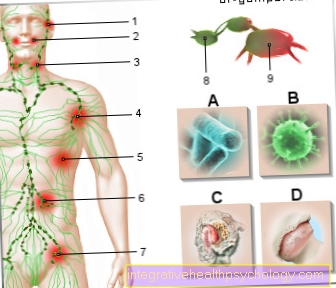
Swollen lymph nodes
Lymphadenopathy
- Lymph nodes on the ear
- Almonds - Tonsils
- Cervical lymph nodes
- Axillary lymph nodes
- Spleen - Sink
- Abdominal lymph nodes
- Inguinal lymph nodes
- Normal lymph node
- Inflamed lymph node
A - bacterial infections
Tonsillitis -
Tonsillar angina
Inflammation of the teeth
diphtheria
(Upper respiratory tract infection)
Syphilis - infectious disease
Chlamydia
(affect mucous membranes in
Eyes-.genital-. and
Airway area)
tuberculosis
(Infectious disease on
most commonly affects the lungs)
Lyme disease
(most common by ticks
transmitted disease)
B - viral infections
Teething problems
(Rubella. Measles. Chickenpox)
Glandular Pfeiffer fever
(Kiss sickness)
HIV
(Human immunodeficiency virus)
responsible for AIDS
Cytomegaly (herpes)
C - cancers
Leukemia (blood cancer) -
ALLES. AML. CLL and CML
Malignant (malignant) lymphomas
(Lymph gland cancer)
Lymph node metastases
D - Other causes
Taxoplasmosis-arises from the
Parasites Toxoplasma gondii,
is transmitted through cats.
Lymphedema (fluid retention
in the intercellular space)
Rheumatoid arthritis (inflammatory
Joint disease)
You can find an overview of all Dr-Gumpert images at: medical illustrations
Therapy of lymph node swelling
The therapy depends entirely on the diagnosis. If it's only one infection acts, it is treated for the symptoms. The same is true of Pfeiffer's glandular fever, which usually remains without consequences, even if it sometimes takes a long time to heal. Also measles and rubella will only be symptomatic treated and the symptoms associated with this disease are alleviated. The numerous STDs, which can also be the cause of the lymph node swelling, are treated differently. Many bacteria are found as pathogens, which can be treated very effectively with a suitable antibiotic. The lymph node swellings almost always disappear with the disease. Unfortunately there is too sexually transmitted diseases like HIV where there is no cure. Here it is important that the immune system is strengthened. If the disease is discovered at an early stage, the onset of the disease can be delayed for years with the help of therapy. For tuberculosis there are special anti-tuberculosis drugs, which are special drugs with which a tuberculosis disease can be treated. Lyme disease (Lyme) is not that easy to treat as several organs are often affected. However, the prognosis in the early stages is very good that the disease will heal with antibiotics. Diphtheria is a very serious disease that, unfortunately, is not uncommon death leads. Here too, the earlier you recognize and treat the disease, the better the chances. The attending physician gives the patient a so-called Antidotethat against that Diphtheria toxin fights directly in the body. The usual drugs such as paracetamol and aspirin as well as ibuprofen, which would also be used for flu, help with inflamed tonsils. These then also treat the fever, which is often associated with tonsillitis. But in some cases one must surgical intervention be made.
In the Therapy of lymph gland cancer chemotherapy and radiation therapy are preferred.
Home remedies to treat swollen lymph nodes
Swollen lymph nodes are a symptom of many things in the body. Besides the Treatment of the underlying disease you can too Use home remedies for swollen lymph nodes.
In the beginning, it can help the swollen lymph nodes easy to massage. This can be done with the Application of heat be combined. Massaging should only be used as long as it does not cause pain.
Another home remedy for swollen lymph nodes is the use of castor oil described, the decongestant properties be awarded. It can be applied to the affected areas and rubbed in. It also has anti-inflammatory agents that can help with infections.
Furthermore, home remedies help against the Underlying disease are directed. One of the most common reasons for lymph node swelling is that cold. Here it helps then Vitamins and trace elements such as zinc to eat more.
Another important measure that must be taken is to avoid harmful and healing-inhibiting substances. These include, above all, alcohol and tobacco smoke. Of course, a long, restful sleep also helps. Home remedies can only help. If the swelling of the lymph nodes does not go down or the symptoms get worse, the cause should be clarified.
forecast
The prognosis depends on the diagnosis and the nature of the disease. Is it just one infection, then it usually doesn't take very long. One usually speaks of a few days. The swelling of the lymph nodes will then go away by itself without the need for medication. Are the lymph nodes though vicious changed and too large, which indicates cancer, the prognosis depends on the stage at which the disease was discovered. Another influencing factor is how well the treatment responds and which cancer is exactly the cause. Unfortunately, the prognoses for many cancers are not particularly good, as many are only discovered when they are already advanced and metastases have spread to other organs. But there is only one infection behind the lymph node swelling is the prognosis very good, because this heals quickly and usually no damage remains. For most other diseases, it always depends on the point in time at which the disease is recognized as such. Many diseases mentioned above are in advanced stages difficult to treat and often have bad Forecasts.
prophylaxis
In many cases, for example, one helps against Lyme disease Tick vaccination. This is a simple and effective protection against this disease. For the most STDs it is true that if you protect yourself adequately with a condom, the risk of falling ill is greatly reduced. Still, it should also be sufficient hygiene be respected. On the other hand, it is difficult to protect yourself against cancer. It is recommended, however, to be regular Checkups to make and in case of complaints the doctor so that you can start therapy quickly. In the case of diphtheria, just like measles and rubella, there is a very good vaccination. If it is always refreshed in good time, you don't have to worry about illness. Before the simple ones Infections one can get away with good nutrition and lots of fresh air as well Sports as well as a general healthy lifestyle protect very well. Because the more intact the immune system is, the less quickly or less often you get sick.


.jpg)



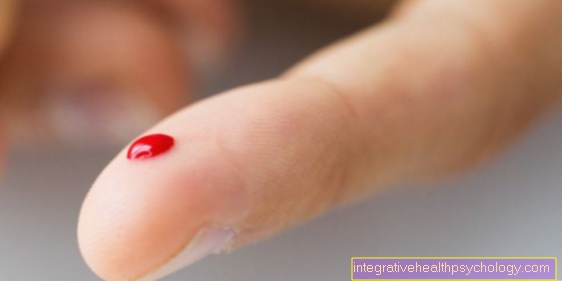







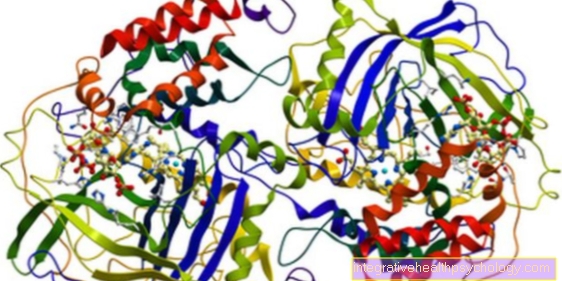
.jpg)











